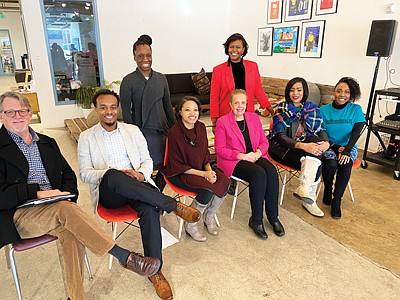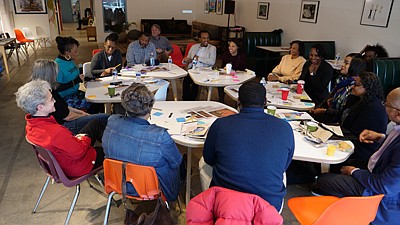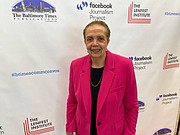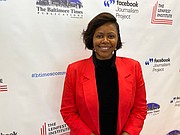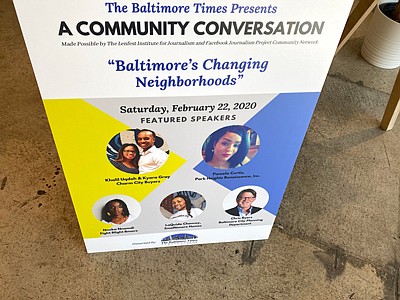NEXT & LAST COMMUNITY CONVERSATION – Conversation 3 (Vision For A Healthier Baltimore) March 7, SAT btcommconvo3.eventbrite.com at the Impact Hub 10 E North Ave, 10am-1pm. See you there.
YouTube
Cheryl Casciani: Reflections in Baltimore’s Changing Neighborhoods
Cheryl Casciani, Director of Planning and Community Revitalization, Baltimore’s Department of Planning reflects on Baltimore’s Changing Neighborhoods: A Community Conversation sponsored by The Baltimore Times. This first of three sessions was held February 22, 2020 at The Impact Hub. Morgan’s Department of Strategic Communication students are media partners on the project.
The Baltimore Times opened its three-part community conversations series with a forum entitled “Baltimore’s Future: A Conversation on Baltimore’s Changing Neighborhoods” on February 22, 2020 at Impact Hub Baltimore.
The meaningful discussion, made possible by a grant from The Lenfest Institute for Journalism and Facebook Journalism Project Community Network, was a way of bringing the community together to create informative sharing opportunities.
Community members, stakeholders, real estate investors and nonprofit leaders convened along with the editorial staff of the Baltimore Times to participate in a session centered around the importance of fair and affordable housing, home ownership and real estate investment.
David Marshall
Table Talk
Following the welcome address by emcee Cassandra Vincent and Baltimore Times publisher Joy Bramble was an informative panel discussionbetween Khalil Uqdah and Kyara Gray of Charm City Buyers, Pamela Curtis of Park Heights Renaissance Inc., Nneka Nnamdi of Fight Blight Bmore and LaQuida Chancey of Smalltimore Homes.
In addition to providing insight on their respective organizations and their community involvement, panelists covered a diverse array of subject matters, including opportunity zones, revitalization, improvements and innovation, investing in disadvantaged communities, redlining and gentrification.
Further, panelists identified unfair housing policies and practices and expressed solutions for what many may perceive as a worsening housing crisis in Baltimore – particularly for Black residents.
David Marshall
Joy Bamble, publisher of the Baltimore Times, gives a welcome address to the participants of the opener of a three-part community conversations series at Impact Hub Baltimore.
David Marshall
Cassandra Vincent, special project lead for the three-part community conversations series at Impact Hub Baltimore and special project and programming manager at The Baltimore Times.
“There’s a lot of information about how we got to today that most people don’t know of. There’s a lot of things that are happening today that people aren’t aware of, so it’s good to have these community assemblies,” said Nnamdi, the CEO of Fight Blight Bmore.
“It also gives an opportunity for what they call creative collisions where people come together and create something authentically in that moment, and it opens the door for more collective and cooperative work going forward.”
Community and economic development, social advocacy, building generational wealth, establishing partnerships and tax credit programs were among some of the solutions discussed along with actionable recommendations like developing in estate plans, seeking financial counsel and investing in land trusts.
“I do think that it’s all about resource sharing, but more importantly it’s about getting the word out there that these organizations exist,” said Chancey, who has endeavors to reduce homelessness by creating more affordable housing through micro shelter and tiny home communities.
“So much of the work that’s done in Baltimore is really siloed and kind of split up, and everybody doesn’t know the impact that is happening around the city, so these kinds of conversations are necessary.”
Chris Ryer, director of Baltimore City Department of Planning, delivered a brief presentation following the panel discussion. In his lecture, Ryer discussed the federal disinvestment in housing and presented a framework for community development as he identified “impact investment areas” and outlined a plan to work with community partners to redevelop underserved neighborhoods.
Lucky Crosby Sr., a concerned resident and public housing advocate, is part of an organization based in Sandtown-Winchester that represents public housing residents and low-income residents in distressed communities. He attended the community conversation and offered insight, too.
“I’m very concerned about the changes in the community, the type of demographics that’s being brought in [and] the safety of the deconstruction of the demolition of the homes in my community,” Crosby said.
To conclude the afternoon, participants engaged in a table talk facilitated by Nnamdi and Chancey, which was somewhat of an extension of the panel discussion. During the roundtable discussion, attendees asked questions, expressed concerns and exchanged ideas related to housing in Baltimore City.
One of the suggestions at the table talk was partnering with the educational system to implement financial literacy in the school curriculum in hopes of increased home ownership for future generations.
Courtesy Photo
The Baltimore Times opened its three-part community conversations series
“I think there’s a lot of very important information being imparted here and I highly recommend it,” said Jacqueline Fulton, a pediatrician based in west Baltimore. “I just think that it’s been very informative. For me, I didn’t know a lot about housing and it’s also letting me know about things happening in Baltimore that a lot of folks like me aren’t aware of.”
Likewise, Erika Jernigan, came to the community conversation to support the Baltimore Times and connect with different resources available at the forum.
Jernigan, the owner of Lexi’s Lil Bug, a children’s rideshare service that serves busy-working families in Baltimore City, Anne Arundel County and Baltimore County.
“I think it will make a major impact,” said Jernigan, “especially if we’re able to track all of the work that’s coming out of the community conversations, and then be able to replicate these conversations in a bigger scale, so that way they’re able to support and grow through the Baltimore Times.”
